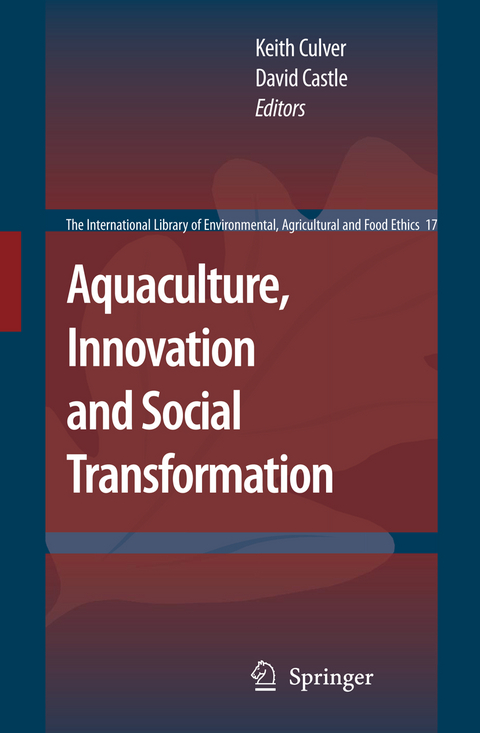
Aquaculture, Innovation and Social Transformation
Springer (Verlag)
978-90-481-8002-8 (ISBN)
Editors’ Introduction.- Editors’ Introduction.- Animal Welfare in Aquaculture.- Animal Welfare in Aquaculture.- Science and Governance Issues in Aquaculture AnimalWelfare.- Welfare and Aquaculture Industry Practice.- Knowledge Management and Intellectual Property Issues in Aquaculture.- The Mark of Innovation in Aquaculture: The Role of Intangible Assets.- New School Fish Production vs Old School Fish Harvesting.- Return on Investment or How Not to Pay Commercial Licenses for Your Own Technology.- The Environmental Sustainability of Aquaculture.- Environmental Aspects of Aquaculture.- Ethics, Governance and Regulation.- A Synopsis of Environmental Issues Associated with Salmon Aquaculture in Canada.- The Interaction Between Traditional and Local Knowledge, and Modern Aquaculture.- “It All Depends on the Lens, B’y”1: Local Ecological Knowledge and Institutional Science in an Expanding Finfish Aquaculture Sector.- “S’kuu See”: Integrating Forms of Knowledge.- Oral History and Traditional Ecological Knowledge.- Messages, Consumers and Aquaculture: New Products, New Worries.- Public Engagement Regarding Aquaculture Products Produced Through Biotechnology.- Consumers and Aquaculture, New Products – New Worries.- Aquaculture Innovation and the Role of Popular and Trade Media.- The Final Frontier: Integrated Coastal Zone Management.- Integrated Systems Analysis for Marine Site Evaluations and Multicriteria Decision Support for Coastal Aquaculture.- Integrated Systems Analysis for Marine Site Evaluation: Appropriate for the Canadian Marine Farming Industry?.- Models for Analysis and Practical Realities of Marine Aquaculure Siting.- New practices for Global Competitiveness: Alternate Species, Alternate Uses, and Value-Added Aquaculture.- Governance for GlobalCompetitiveness: The Future of Aquaculture Policy in aWorld Turned Upside Down.- Consumer Confidence, Food Safety, and Salmon Farming.- Aquaculture Policies for Global Competitiveness: An Industry Perspective.
| Erscheint lt. Verlag | 19.11.2010 |
|---|---|
| Reihe/Serie | The International Library of Environmental, Agricultural and Food Ethics ; 17 |
| Zusatzinfo | XII, 346 p. |
| Verlagsort | Dordrecht |
| Sprache | englisch |
| Maße | 155 x 235 mm |
| Themenwelt | Geisteswissenschaften ► Philosophie ► Ethik |
| Naturwissenschaften ► Biologie ► Limnologie / Meeresbiologie | |
| Naturwissenschaften ► Biologie ► Ökologie / Naturschutz | |
| Naturwissenschaften ► Biologie ► Zoologie | |
| Weitere Fachgebiete ► Land- / Forstwirtschaft / Fischerei | |
| ISBN-10 | 90-481-8002-3 / 9048180023 |
| ISBN-13 | 978-90-481-8002-8 / 9789048180028 |
| Zustand | Neuware |
| Informationen gemäß Produktsicherheitsverordnung (GPSR) | |
| Haben Sie eine Frage zum Produkt? |
aus dem Bereich


